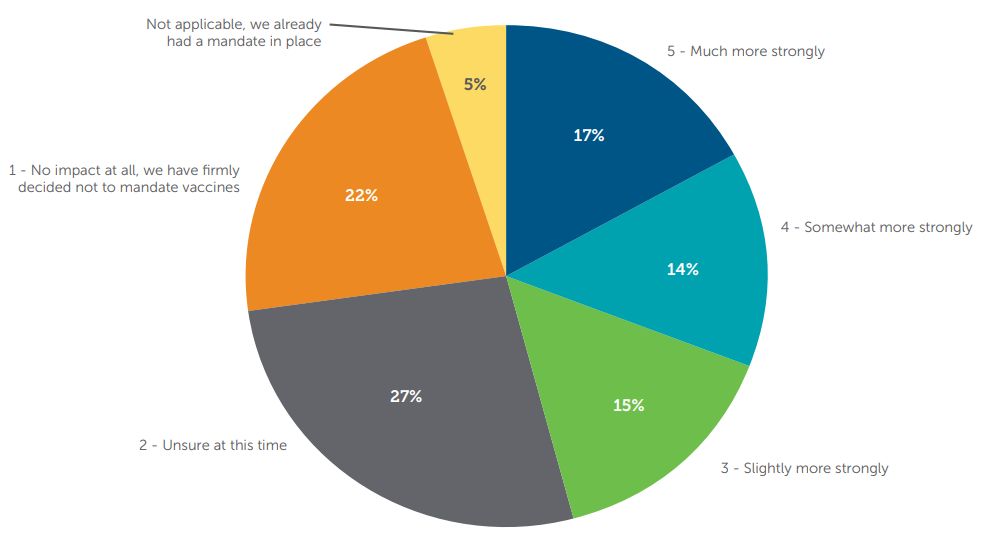This report analyzes data gathered from more than 1,600 in-house lawyers, C-suite executives and HR professionals. The survey gauged employers' key concerns and strategies related to mandating and encouraging COVID-19 vaccinations among their workforces.
Executive Summary
After more than a year of a crushing global pandemic, the early summer brought hope for a long-anticipated return to normal business operations, at least in the United States. But those plans were derailed by the rapid spread of the highly contagious delta variant and mounting COVID-19 infections, which reached a six-month high in the U.S. by early August.
The abrupt change left companies - many of which had just updated plans with an eye toward a post-pandemic future - scrambling to adjust policies for return-to-office timing, vaccinations and mask wearing.
On the issue of vaccines, employer mandates that seemed unlikely several months ago - in a survey we conducted in January, less than 1 percent of employers were mandating vaccination and just 9 percent were planning to in some form - are swiftly becoming more of a reality. Companies in a wide range of industries have announced mandates and even the U.S. military recently decided to require vaccines for active-duty troops.
While big names may be making news with such mandates, many other employers across the country are still grappling with their vaccination plans - or whether to make any. To better understand where employers stand and where we may be headed next, Littler surveyed 1,630 in-house lawyers, C-suite executives and HR professionals from a variety of industries about their current plans, concerns and key considerations when it comes to vaccination of their workforces.
What we found was a notably greater openness to the idea of vaccine mandates as compared with earlier in the year. While only 9 percent of employers are currently mandating vaccines for some or all of their workers, another 12 percent are planning to impose a mandate in the near future (8 percent) or for specific subsets of individuals (4 percent).
At this time, a significant majority (63 percent) are still planning on encouraging - rather than mandating - the vaccine. But that might be changing, given the recent rise in COVID-19 cases. Nearly half of those surveyed (46 percent) are more strongly considering a new vaccine mandate due to the recent rise in cases; 27 percent are unsure, while just 22 percent say they have firmly decided not to institute a mandate.
To what extent is your organization more strongly considering a vaccine mandate due to the recent rise in COVID-19 cases, including the spread of the delta variant?

Something that hasn't changed since January are employers' key concerns about instituting vaccine mandates: Respondents' top two concerns still relate to resistance from those who are not in a protected category but refuse to get vaccinated (75 percent) and the impact on company culture and employee morale (69 percent). Meanwhile, in today's tight labor market, the stakes have been raised: Sixty percent now fear the possible loss of staff and difficulty operating due to termination or resignation of employees who don't wish to be vaccinated.
As one C-suite executive for a long-term healthcare company told us: "We are already suffering a critical staff shortage. Mandating vaccination for healthcare workers who are against it will hurt this hospital and community even if I support it."
In what follows, we'll dig deeper into this new data - uncovering what might move the needle for companies when it comes to mandating vaccines, how they define their mandate policies, what they're doing to encourage their workers to get vaccinated and to keep them safe, and more.
In the charts and analysis that follow, responses to some questions do not add up to 100 percent due to rounding, and some exceed 100 percent because respondents were invited to select more than one answer. For the full survey methodology and a breakdown of respondent demographics, see page 13.
To view the full article, please click here.
The content of this article is intended to provide a general guide to the subject matter. Specialist advice should be sought about your specific circumstances.


